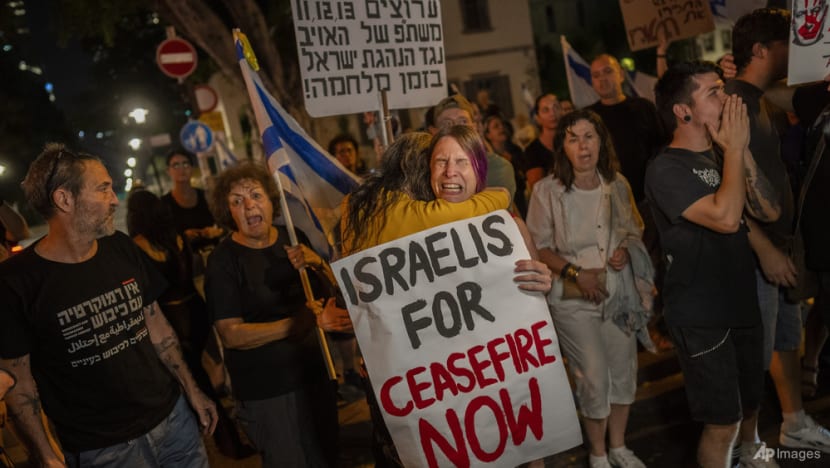Israel-Hamas ceasefire deal fragile but gives hope for future negotiations: Observers
Mediators of the breakthrough truce sought to commence the pause in fighting on Thursday morning but the deal has been postponed to Friday.


This audio is generated by an AI tool.
As hundreds of families in Israel and Gaza anxiously await the release of their loved ones under a temporary truce between Israel and Hamas, observers warned the ceasefire deal is so fragile that any move can derail the process even before the first prisoner swap takes place.
“No one can guarantee that it will actually take place. It is very problematic and risky,” said Dr Eyal Mayroz, a senior lecturer of peace and conflict studies at The University of Sydney.
“Any kind of escalation in violence, any instance of firing a shot on either side, can stop this delicate process. We have to wait until it starts and even then, it will not be foolproof.”
Seven weeks into the Israel-Hamas war, both sides on Wednesday (Nov 22) agreed to a ceasefire in Gaza for four days. The militant group agreed to free 50 hostages in return for 150 Palestinians jailed in Israel.
Mediators of the Qatar-negotiated truce sought to commence the pause in fighting on Thursday morning but the deal has been postponed to Friday.
Israel, which has published a list of 300 Palestinians who could be freed, said the delay was due to Hamas having not yet signed the agreement, and not submitting the names of the hostages slated for release.
Observers said that despite the delay and the fragility of the truce, reaching such a complex agreement amid the conflict is significant and could set the stage for future negotiations.
“It’s remarkable that they have arrived at this,” said Professor Mohammed Abu-Nimer, who is the Abdul Aziz Said Chair in International Peace and Conflict Resolution at the American University's School of International Service.
“It is definitely a shift, and gives hope that diplomacy and negotiation in later stages could build on this,” he told CNA’s Asia First.
However, he cautioned that the pause is a shaky and complicated operation for both sides and the parties overseeing it.
WHO WILL MONITOR THE FRAGILE TRUCE?
With neither Israel nor Hamas able to trust the other, Qatar, Egypt and the United States play important roles in ensuring that both sides stick to their words, noted Professor Michael Barnett from the George Washington University’s Elliott School of International Affairs.
“There really aren't any enforcement mechanisms if one of the parties breaks what it agreed to. Nonetheless, all sides have an interest in making sure that at least the four days of the ceasefire hold,” he said.
Qatar’s strong relationship with the Hamas political leadership, which allows direct access for negotiations, was instrumental in securing the breakthrough hostage deal, analysts said.
Related:
On Oct 7, Hamas militants abducted about 240 people – including foreigners from at least 25 countries – during their surprise rampage into Israel that killed 1,200 people.
While it is not known who the captives who could be released are, Prof Barnett believes they will likely be Israelis.
“Israel has been insistent that its hostages get released first. I'm doubtful that they would have agreed to a pause if the hostages that are going to be released are not Israelis,” he said.
WHY DID NETANYAHU CHANGE HIS MIND?
Israel’s Prime Minister Benjamin Netanyahu has come under intense pressure from families of hostages demanding his administration does more to secure their release.
Domestic pressure likely explains his agreement to the hostage deal, after having rejected international calls for a ceasefire for weeks, Prof Abu-Nimer said.
“They (Israelis) need to see some significant progress on the issue of hostages. And Netanyahu failed. His military operation failed to release hostages, and failed to eliminate Hamas militarily after 45 days,” he said.
Israel’s retaliatory offensive into the Gaza Strip following the militant group’s attack has since devastated the enclave, with the Hamas-run health ministry saying 14,000 people have been killed.
Many are hoping the brief truce will allow desperately-needed humanitarian relief to pour into the besieged territory.
However, it is unclear how much aid would be allowed to enter Gaza under the deal.
THE WAR SET TO CONTINUE
Prof Barnett said that while the truce is a move in the right direction, he is not optimistic about the situation, pointing out that four days later, the war is set to continue.
“The hope is that this is something to build on. But as Netanyahu said, Israel will resume the war until the goals are met – which is the destruction of Hamas and the return of the remaining hostages.”
“The over 2 million Palestinians in Gaza are starving and without water. There's no fuel to run generators, or for equipment at the hospitals. Hence, there's still a lot to be desired,” he said.
Related:
Dr Mayroz said that Israel’s objective of eliminating Hamas will likely not be a successful campaign due to the humanitarian cost involved.
“The reasons for Israel wanting to destroy Hamas are valid because a Gaza controlled by Hamas can no longer exist in terms of Israel's security concerns,” he said.
“But at the same time, the toll on the civilian population of Gaza is so terrible that if Israel cannot destroy Hamas, then what is going to be the end game? This is a very difficult situation for all who are involved in how to solve this conundrum.”














